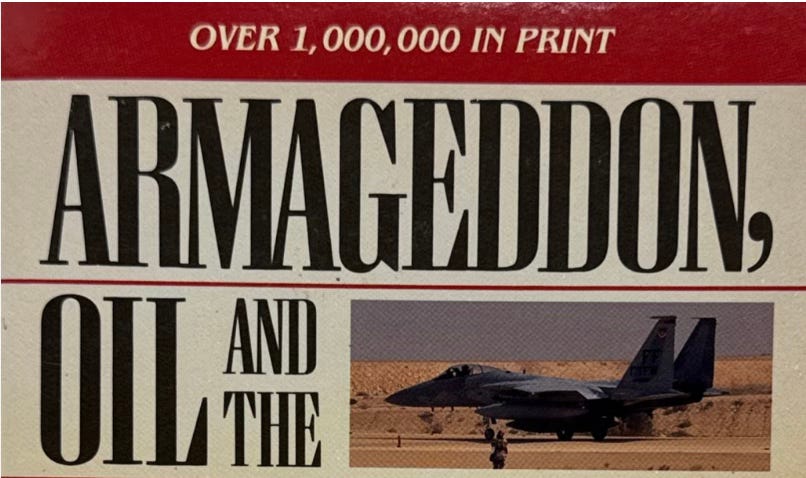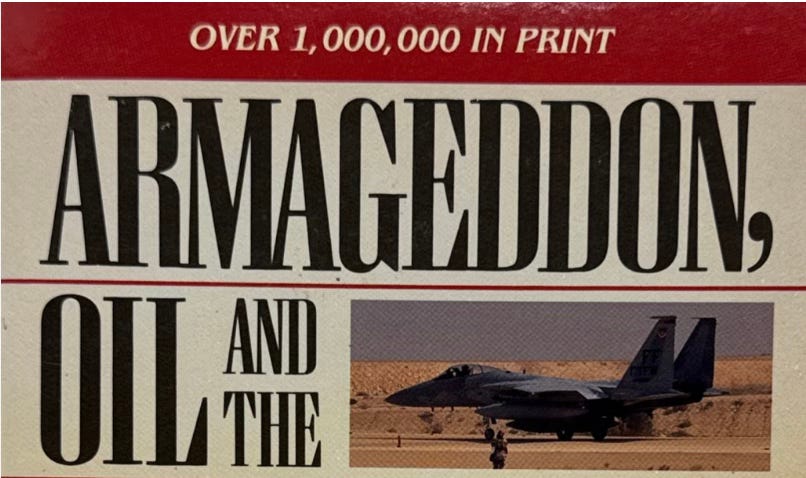Revelation and the Story We Live In / El Apocalipsis y la historia en que vivimos
I don't share much in common with the Left Behind books––except this (sort of) / No tengo mucho en común con los libros de Dejado Atrás--excepto esto (en parte)
[This is part of my processing of the material from the Apocalypse course from Bethlehem Bible College. Click here to see related posts.]
Question: In your experience how do people typically interpret the Book of Revelation? How have you understood that it applies to your life? This course presents the idea that John’s vision spoke first to the Christians of his day. From this perspective it is important to understand what John was saying to the churches in his day, and how these exhortations speak to us.
I was in junior high when the Gulf War began in the early 1990s, and I remember seeing a book cover with a fighter jet and a title about Armageddon and the Middle East. Now that I look it up, it’s just as I remember: Armageddon, Oil, and the Middle East Crisis: What the Bible Says About the Future of the Middle East and the End of Western Civilization. I was eleven or twelve, and while I had no interest in reading the book at the time, the cover alone was enough to stir fear about the future and make assumptions about its message.
Looking back at the book now, my assumptions about its content were pretty close to accurate—largely because of how prevalent end-times speculation was at the time. Many of us knew the lyrics to “I Wish We’d All Been Ready,” and the Left Behind series was about to affect many people’s thoughts about what the Bible says about the future more than the Bible itself.

I held those assumptions (that Revelation is about topics like a rapture, Great Tribulation, an antichrist, etc.) until I took an elective course in college titled “The New Testament and the End Times.” The professor had been a Bible scholar much longer than I had been alive, and he acknowledged the popular view but didn’t seem persuaded by it. He also introduced us to other ways of reading the relevant passages of Scripture, including Revelation. That was the first time I ever considered the possibility that the Bible might be saying something different than the book with the fighter jet on the cover.
Instead of feeling like I knew more after that class, I realized that I had assumed too much, but also was aware that I didn’t know much, so I adopted a more agnostic stance—one I think many people share. If you’ve ever read Revelation and come away thinking, “I don’t really understand this, but at least Jesus wins in the end,” then you know the feeling. That was my posture for quite a while.
But now, my understanding of (and love for) Revelation differs drastically from that of the pop eschatology around us and the shoulder-shrugging agnosticism about the book. As I have enjoyed swimming in its very deep waters over the last several years, I have noticed something that my understanding has in common with the view that still floats around in the air in my culture: I don’t think any other book of the Bible describes the story in which we are living as fully as Revelation.
Even if the promoters of the popular view might nod along in agreement with that, we mean very different things by it. For example, if I get into a conversation about Revelation with others, it does not take long for me to establish myself as strange if I point out that Revelation never mentions a rapture, the antichrist, the coming great tribulation (because John said he and his readers were already in it), or Jesus coming back as a Lion.
This view is strange to some because, like the book with the fighter jet, the popular understanding is that John wrote Revelation almost entirely about events in his future. In contrast, I have come to be convinced that he described the story he and his readers were living in then and we still live in now. Yes, there are hints of the future in this story, climaxing with the assurance that God is making all things new and Jesus’ statement, “Surely I am coming soon.” But the story that John’s readers lived in then, and we live in now, is about Jesus as the Lamb who has conquered and what it means to follow him in the face of the destructive empires of the world. Or, as Robert Mulholland described it, it is about living as a citizen of New Jerusalem in the midst of a Fallen Babylon world.
I want to learn to see in John’s way––viewing the world around us with clarity, seeing and hearing Jesus and his way in the midst of it, and shaping my life accordingly.
[Next question: Empire, Babylon, and . . . Us?]
El Apocalipsis y la historia en que vivimos
No tengo mucho en común con los libros de Dejado Atrás--excepto esto (en parte)
[Esto es parte de mi procesamiento del material del curso Apocalipsis del Instituto Bíblico de Belén. Haga clic aquí para ver entradas relacionadas.]
Pregunta: Según su experiencia, ¿cómo suele interpretar la gente el libro del Apocalipsis? ¿Cómo ha entendido que se aplica a su vida? Este curso presenta la idea de que la visión de Juan hablaba en primer lugar a los cristianos de su tiempo. Desde esta perspectiva es importante entender lo que Juan decía a las iglesias de su tiempo, y cómo estas exhortaciones nos hablan a nosotros.
Yo tenía once años cuando empezó la Guerra del Golfo a principios de los 90, y recuerdo haber visto la portada de un libro con un avión de combate y un título sobre el Armagedón y Oriente Medio. Ahora que lo busco, es tal como lo recuerdo: Armagedón, petróleo y la crisis de Oriente Medio: Lo que dice la Biblia sobre el futuro de Oriente Medio y el fin de la civilización occidental. Aunque en aquel momento no tenía ningún interés en leer el libro, la portada por sí sola era suficiente para despertar el miedo sobre el futuro y hacer suposiciones sobre su mensaje.
Mirando ahora el libro en retrospectiva, mis suposiciones sobre su contenido eran bastante acertadas, en gran parte debido a lo extendida que estaba la especulación sobre el fin de los tiempos en aquella época. Muchos de nosotros conocíamos la letra de una canción: «Ojalá todos hubiéramos estado preparados», y la serie Dejado Atrás estaba a punto de afectar a los pensamientos de muchas personas sobre lo que la Biblia dice sobre el futuro más que la propia Biblia.

Mantuve esas suposiciones (que el Apocalipsis trata temas como un rapto, la Gran Tribulación, un anticristo, etc.) hasta que tomé un curso optativo en la universidad titulado «El Nuevo Testamento y el Fin de los Tiempos». El profesor había sido un erudito de la Biblia mucho más tiempo del que yo había vivido, y reconoció la visión popular, pero no parecía persuadido por ella. También nos presentó otras formas de leer los pasajes pertinentes de las Escrituras, incluido el Apocalipsis. Aquella fue la primera vez que me planteé la posibilidad de que la Biblia dijera algo distinto que el libro con el avión de combate en la portada.
En lugar de sentir que sabía más después de esa clase, me di cuenta de que había asumido demasiado, pero también era consciente de que no sabía mucho, así que adopté una postura más agnóstica, una que creo que comparte mucha gente. Si alguna vez has leído el Apocalipsis y te has quedado pensando: «Realmente no entiendo esto, pero al menos Jesús gana al final», entonces conoces esa sensación. Esa fue mi postura durante bastante tiempo.
Pero ahora, mi comprensión (y mi amor) por el Apocalipsis difiere drásticamente de la escatología pop que nos rodea y del agnosticismo que se encoge de hombros ante el libro. Como he disfrutado nadando en sus profundas aguas durante los últimos años, me he dado cuenta de algo que mi comprensión tiene en común con la visión que todavía flota en el aire en mi cultura: No creo que ningún otro libro de la Biblia describa la historia en la que vivimos de forma tan completa como el Apocalipsis.
Aunque los promotores del punto de vista popular puedan asentir con la cabeza, nos referimos a cosas muy diferentes. Por ejemplo, si entablo una conversación sobre el Apocalipsis con otras personas, no tardo en quedar como un extraño si señalo que el Apocalipsis nunca menciona un rapto, el anticristo, la gran tribulación venidera (porque Juan dijo que él y sus lectores ya estaban en ella), o a Jesús regresando como un León.
Este punto de vista resulta extraño para algunos porque, al igual que el libro del avión de combate, la creencia popular es que Juan escribió el Apocalipsis casi exclusivamente sobre acontecimientos futuros. Yo, en cambio, estoy convencido de que describió la historia que él y sus lectores vivían entonces y que nosotros seguimos viviendo ahora. Sí, hay indicios del futuro en esta historia, que culmina con la seguridad de que Dios está haciendo nuevas todas las cosas y la declaración de Jesús: «Ciertamente vendré pronto». Pero la historia en la que los lectores de Juan vivían entonces, y en la que nosotros vivimos ahora, trata de Jesús como el Cordero que ha vencido y de lo que significa seguirle frente a los imperios destructivos del mundo. O, como lo describió Robert Mulholland, se trata de vivir como ciudadano de la Nueva Jerusalén en medio de un mundo de Babilonia caída.
Quiero aprender a ver a la manera de Juan: ver el mundo que nos rodea con claridad, ver y oír a Jesús y su camino en medio de él, y modelar mi vida en consecuencia.
[Siguiente pregunta: Imperio, Babilonia y. . . ¿Nosotros?]


